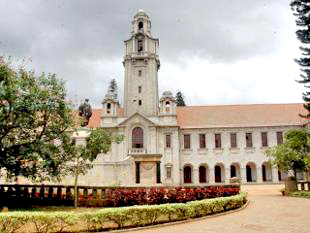Mumbai, Sep 22: In a boost to the government's drive to make the country's higher education institutions world class, a record 31 Indian institutes have found a place in the Times Higher Education World University Rankings 2016-17.
 Indian Institute of Science (IISc) Bangalore has climbed to the highest position till date for an Indian institute, even as a place in the top 200 list continues to elude the country. IISc now figures in the 201-250 band, up from 251-300 last time.
Indian Institute of Science (IISc) Bangalore has climbed to the highest position till date for an Indian institute, even as a place in the top 200 list continues to elude the country. IISc now figures in the 201-250 band, up from 251-300 last time.
While Times Higher Education (THE) has expanded the number of universities in the list to 980 from 800 last year, India has 19 institutes in the top 800, two more than last year.
Besides IISc, Indian Institute of Technology (IIT) Bombay also figure in the top 400. IIT Bombay remains in the same 351-400 band as in last year.
"India has four new entries in the top 800," said Phil Baty, editor of Times Higher Education World University Rankings. "The country's strong performance is partly thanks to the country recognising the importance of participating in global benchmarking exercises; just last month the government launched a new funding-backed project aimed at catapulting Indian Institutes of Technology to the top of world university rankings," Baty said in a statement.
Rohin Kapoor, director at Deloitte in India, said, "The government's focus on improving India's standing in global rankings - and even the introduction of the India-specific rankings - has started to yield results."
Going forward, there needs to be discussions between ministries to facilitate free flow of students and faculty, he said. "Once internationalisation and globalisation happens, India's rankings will improve significantly. This is one of the critical areas where India is lagging behind," Kapoor said.
IIT Delhi, IIT Kanpur and IIT Madras figure in the 401-500 bracket; IIT Kharagpur, IIT Roorkee and Jadavpur University in the 501-600 group; and, Aligarh Muslim University, Birla Institute of Technology and Science, Pilani, University of Calcutta, University of Delhi, IIT Guwahati, NIT Rourkela, Panjab University, Savitribai Phule Pune University, Sri Venkateswara University, Tata Institute of Fundamental Research and Tezpur University in the 601-800 group.
Institutes ranked in the 801+ band include Acharya Nagarjuna University, Amity University, Amrita University, Andhra University, Cochin University of Science and Technology, Maharaja Sayajirao University of Baroda, Manipal University, Osmania University, SASTRA University, Sathyabama University, SRM University and Vellore Institute of Technology.
NIT Rourkela, Sri Venkateswara University, TIFR and Tezpur University are the new entrants in the top 800 list, while Amrita University and Andhra University slipped down to the 801+ group.
Baty said that while most Asian countries are suffering from an ageing population, the numbers of young people in South Asia are booming. "India is set to have the largest student population by 2025, with the number of 18 to 22-year-olds predicted to reach 119 million," he said.
This year's expanded list, Baty said, is a testimony to how competitive global higher education has become. The 980 universities come from 79 different countries. Also, the US has lost the top spot for the first time in the 12-year history of the rankings this year with University of Oxford becoming the world's top university. Others in the top five include California Institute of Technology, Stanford University, University of Cambridge and Massachusetts Institute of Technology.





Comments
I see your website needs some fresh & unique content. Writing manually is time consuming,
but there is tool for this task. Just search for - Digitalpoilo's tools
Feel free to surf to my webpage: TonjaAgareff: http://Kia.blogspot.de
Add new comment